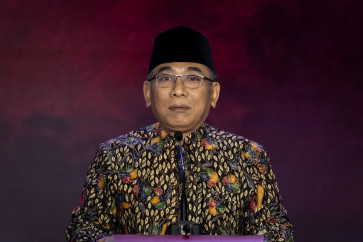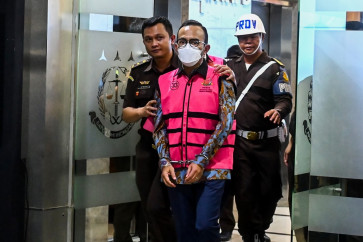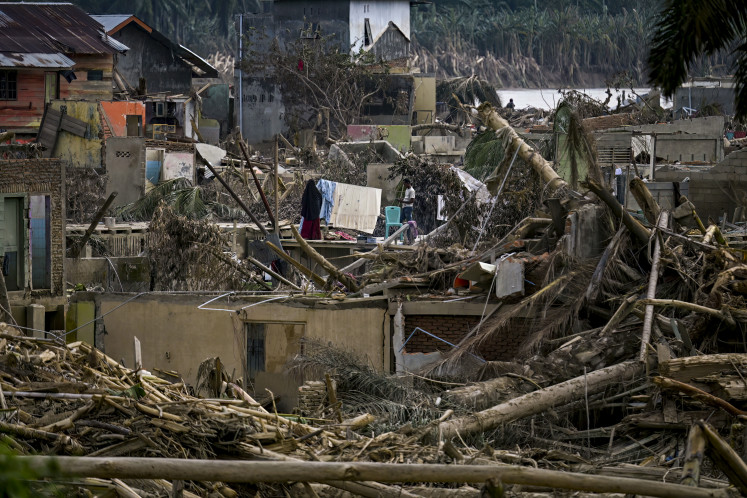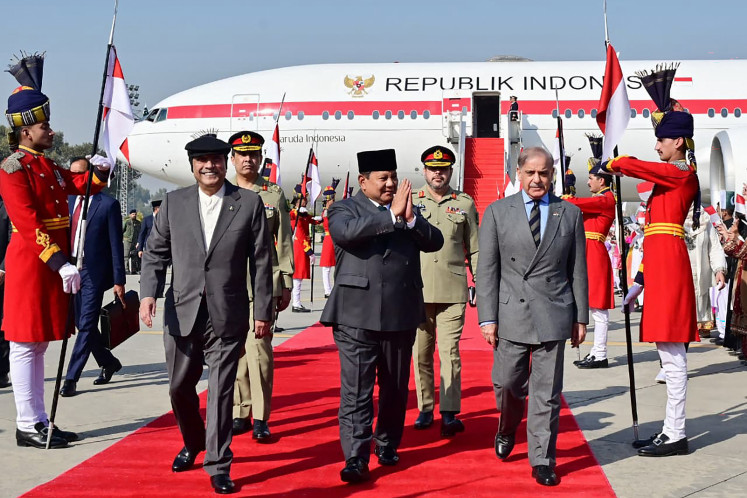Popular Reads
Top Results
Can't find what you're looking for?
View all search resultsPopular Reads
Top Results
Can't find what you're looking for?
View all search resultsJokowi calls for protection of Gafatar
Uncertainty ahead: Fajar Nusantara Movement (Gafatar) members evicted from a settlement in West Kalimantan are helped by police and military personnel upon their arrival at Tanjung Priok Port in North Jakarta on Wednesday
Change text size
Gift Premium Articles
to Anyone
 Uncertainty ahead: Fajar Nusantara Movement (Gafatar) members evicted from a settlement in West Kalimantan are helped by police and military personnel upon their arrival at Tanjung Priok Port in North Jakarta on Wednesday. More than 700 followers are being accommodated at a government-run shelter in Cibubur, East Jakarta, before being sent back to their hometowns in Java. (JP/Seto Wardhana) (Gafatar) members evicted from a settlement in West Kalimantan are helped by police and military personnel upon their arrival at Tanjung Priok Port in North Jakarta on Wednesday. More than 700 followers are being accommodated at a government-run shelter in Cibubur, East Jakarta, before being sent back to their hometowns in Java. (JP/Seto Wardhana)
Uncertainty ahead: Fajar Nusantara Movement (Gafatar) members evicted from a settlement in West Kalimantan are helped by police and military personnel upon their arrival at Tanjung Priok Port in North Jakarta on Wednesday. More than 700 followers are being accommodated at a government-run shelter in Cibubur, East Jakarta, before being sent back to their hometowns in Java. (JP/Seto Wardhana) (Gafatar) members evicted from a settlement in West Kalimantan are helped by police and military personnel upon their arrival at Tanjung Priok Port in North Jakarta on Wednesday. More than 700 followers are being accommodated at a government-run shelter in Cibubur, East Jakarta, before being sent back to their hometowns in Java. (JP/Seto Wardhana)
U
span class="caption">Uncertainty ahead: Fajar Nusantara Movement (Gafatar) members evicted from a settlement in West Kalimantan are helped by police and military personnel upon their arrival at Tanjung Priok Port in North Jakarta on Wednesday. More than 700 followers are being accommodated at a government-run shelter in Cibubur, East Jakarta, before being sent back to their hometowns in Java. (JP/Seto Wardhana)
President Joko 'Jokowi' Widodo told his Cabinet members on Wednesday they needed to take care of the followers of the Fajar Nusantara Movement (Gafatar), a spiritual cult that seeks an alternative communal life for its members, who have been evicted from their community in West Kalimantan.
'They are citizens too. They are entitled to state protection,' Jokowi said, as quoted by the Coordinating Political, Legal, and Security Affairs Minister Luhut Pandjaitan at a media briefing in his office.
More than 1,000 Gafatar followers, mostly women and children, have been displaced after their housing complex in Mempawah was attacked on Jan. 19 by a mob of between 3,000 and 5,000 people. The attacks were triggered by reports, some released by government officials, that the cult posed a serious security threat to the country, and also to Islam.
The government is currently in the process of evacuating the group to Java, where most of them originate from. The plan to send them back to their original Javanese villages, however, could meet with opposition from locals, many of whom have already said they are not welcome. Many Gafatar members have no home to go to, having sold their property and given all their money to the organization.
The evictions had to stop, Luhut demanded, amid growing fears that similar Gafatar communities in 18 other provinces could face the same fate.
The government previously stated that Gafatar was not registered as a mass organization and that it had hidden political motives. The Indonesian Ulema Council (MUI) has declared it a deviant sect.
Social Affairs Minister Khofifah Indar Parawansa said that the government was treating the evicted people as 'victims of social conflict', which entitled them to full state assistance.
As of Tuesday night, there were more than 1,100 Gafatar members living in three separate barracks in Pontianak, West Kalimantan, waiting to be flown or transported by boat back to Java.
On Wednesday morning, at least 712 Gafatar members, who had been evacuated from Pontianak on board Navy vessel KRI Teluk Banten, landed at Tanjung Priok Port in North Jakarta. Later in the day, 1,821 others from Ketapang, West Kalimantan, arrived at the Tanjung Emas Port in Semarang, Central Java.
While in government care, they were receiving counseling, health care services, spiritual guidance and state guidance, as well as schooling for the children, Khofifah said, noting that in Mempawah, the children received home-schooling rather than attending state schools.
Having spent the last two days with them, she said she felt a strong sense of community among Gafatar's members, and that they all worked as farmers on communal lands.
National Police chief Gen. Badrodin Haiti said 26 leaders of the group were currently under investigation to determine if they had violated any laws. They would be detained for questioning, he said, while the rest of the group would be sent back to their original villages.
He also said that Gafatar was a reincarnation of the Islamic State of Indonesia (NII) movement, which fought on and off for decades to turn Indonesia into an Islamic state. They had the same objectives and motivations and the same methods, he added.
'We must not tolerate them, even though the Constitution guarantees freedom of religion,' Badrodin said, adding that although Gafatar leaders and members had dissolved the group, their practices remained.
The MUI observed that Gafatar no longer used Islamic banners, as it had in the past in order to avoid a government ban, though it noted that the earlier group from which it metamorphosed, Al Qiyadah Al Islamiyah, had been banned and its leader Ahmad Musadeq jailed for four years in 2004 under the 1965 Blasphemy Law.
Human rights campaigners have blasted the government for its indecisiveness in resolving the conflict, while National Commission on Human Rights (Komnas HAM) chairman Nur Kholis has expressed his disappointment over the government's lack of initiative in mediating the social unrest in Mempawah.









